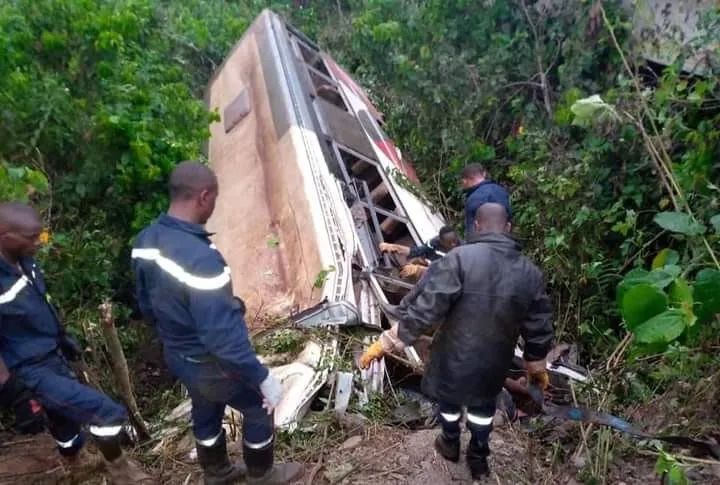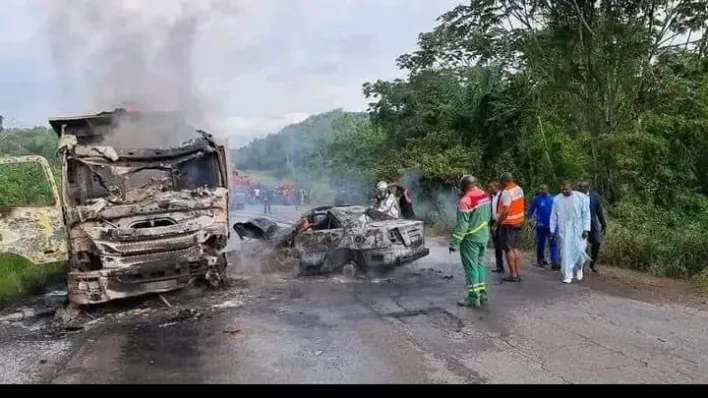According to a report released in 2019 by the UN Economic Commission for Africa, Cameroon was identified as one of the African countries that experienced a high number of road traffic accidents. On average, there were 16,583 road accidents and 1,500 fatalities recorded annually in Cameroon.
However, it is important to acknowledge that this number could potentially be much higher as a result of underreporting. Cameroon has a higher risk of road deaths compared to its neighbouring countries, with an estimated rate of 26.7 per 100,000 people. This alarming statistic prompts us to ask: What is the cause of the high number of road accidents in Cameroon, especially those resulting in fatalities, and how can we tackle this problem?
Who or what Is to Blame?
Many Cameroonians have experienced the consequences of road accidents either personally, through family members, or within their communities. The debate regarding the primary causes of these accidents continues to be a topic of discussion among people.
One student in Douala, who wished to remain anonymous, expressed her perspective on the matter. According to her, accidents occur not solely due to road conditions but because drivers fail to take necessary precautions.
She noted, “The road condition is not good…The drivers are not conscious [of the roads]. A driver knowing that the road is bad must take precautions, drive with caution, and be aware that even the slightest sudden movement can lead to an accident.”
“Here, everyone is in a hurry, and drivers often disregard road laws, this is also a cause of traffic accidents,” she continued.
Hussein Mouliom, a Cameroonian student based in Paris, shared a similar perspective. He acknowledged that both road conditions and drivers play a role in the high accident rate.
“Firstly, the roads are not good and secondly, the people don’t know how to drive and don’t respect the laws of the roads. And also, the excessive number of motorcycles.”
There are several contributing factors to road accidents in the country. One is the neglect of road safety rules. According to Country Reports, drivers in Cameroon often disregard road safety rules, especially considering that there are few road and traffic signs and that the speed limits of 60 kph in cities and less than 100 kph in rural areas are rarely enforced. There are also no national or local laws restricting the use of phones while driving which can lead to distraction.
In the same report from the UN Economic Commission for Africa, they identified major contributors to road accidents in Cameroon, including drivers’ inattention and distraction (30.67%), speeding (19.97%), and drivers’ lack of control.
The highest contributor to road accidents, however, was the state of roads across the country, especially when traveling at night or during the rainy season.
“The country’s road network, which accounts for 85 percent of transport in the country, suffers, among other problems, from a lack of signaling and markings, cracks, potholes, poor rainwater drainage, lack of sidewalks and cycle paths, and disorderly parking. Less than 10,000 km of paved roads and the roads that are paved not well maintained,” the report said.
Who is responsible for road construction?
Since its creation in 1996, The Road Fund Cameroon has overseen the financing and regulations of road projects in the country. They operate under the financial supervision of the Ministry of Finance and rely on various sources of revenue to fund road projects. These include road user charges (RUC), road tolls, axle taxes, transit taxes, fines, budget allocations from ministries, and resources generated from cash surpluses, donations, subsidies, and aids from financial partners. However, issues concerning their transparency and project delays have raised questions about the effectiveness of the Road Fund in fulfilling its responsibilities.
Budget
Cameroon’s road construction projects have faced budget challenges over the years. In 2013, it was reported that road construction in Cameroon cost 205 million FCFA per kilometer, significantly higher than the African average of 100 million FCFA per kilometer.
Considering the price of road construction being so high, the industry remains a booming sector, with a positive Compound Annual Growth Rate (CAGR) of 13.56% from 2017 to 2021, reaching an output value of 418,877.43 million FCFA in 2022.
One of the primary concerns of the Road Fund’s transparency is its financial irregularities. It is unclear how the Road Fund screens and selects companies for road construction projects. The lack of transparency in this process raises questions about favoritism and the allocation of contracts to qualified contractors, considering that they work with both Cameroonian and international companies.
In their 2021 report, they identified duplicate payments to service providers totaling 496 million FCFA.
“After a careful examination of the internal control report for the financial year 2020, the Road Fund’s Management identified several duplicate payments made over the 2018-2020 period to some service providers, amounting to 496 million FCAF…” it reads.
These providers included:
EDGE SARL
AE VENTURE
BERED
SARTECH
SIFCAM
MASSO
CETP
SUPER CONFORT
MBU ETS
TOUS TRAVAUX
ATECBA
MBUNYA AND SON
Since then, five companies have yet to refund the invoices.
AE VENTURE
SARTECH
MASSO
ATECBA
MBUNYA AND SON
They were all referred to Special Criminal Court there have been no updates on their cases so far.
Materials and Delays
There is also no way to find out the consequences if these companies do not meet their project deadlines which can contribute to delays. For example, according to Business in Cameroon, in 2022 the Cameroonian government completed the asphalting of 395 km of new roads throughout Cameroon, which was 97 km short of the 492.2 km target set for that year.
One of these roads was the construction of the eastern highway of Douala, at the entrance to the city. The financial resources (at least 34 billion FCFA) had already been made available since January 2022 by the successful bidder, a Canadian company called Magil, yet the work has not yet been completed.
Though the budget for road construction is so much higher than the average of other African countries the materials being used are still of no better quality. One road in particular, Mile 13 (PK 13) in Douala was repaired about 5 months ago and as first reported by MMI in August there is already major damage.
Many theorized on why this could by one person, Yaah Maggie Kilo writing, “There are many reasons for roads falling apart so soon after being built. Building during the wrong season; using shoddy quality construction materials; poor & ineffective equipment; low quantities of materials than recommended, poor supervision & lack of adequate maintenance.”
Asphalt roads, which are the main material used in Cameroon, are likely to last at least 18 years. Even when considering factors like temperature, traffic-induced wear and tear, and erosion it is unlikely that there should have been extreme damage in less than a year.
Proposed solutions from the government
The government has been working on various solutions to address delays in road construction and safety for drivers and passengers. In 2021 Cameroon implemented solutions to reduce road costs. The government announced a 10 billion FCFA investment for the construction of four crushing plants to produce cheaper materials. Since then, there have been very few public updates on how this investment has been implemented and if it is working to reduce costs.
The Ministry of of Public Works is also currently constructing 14 automatic toll gates expected to go operational by the end of 2023.
“We are confident that the toll gates will be a success. They will help to improve road infrastructure, reduce traffic congestion, and raise revenue for the government.”
However, one of the possible negative impacts is drivers attempting to avoid paying tolls may try to find alternative routes which may be in worse condition triggering more accidents.
Other solutions
Other proposed solutions could include more transparency from the Road Fund Cameroon and private contractors. Regular publications of annual reports and clear documentation of the selection process for companies. And for private contractors reevaluating their involvement in road construction. Such as the materials they use so as not to cut costs and prevent rapid deterioration. One way to do this would be quality control checks during construction.
Another solution could be to focus primarily on maintaining already paved roads before constructing new ones. Redirecting some resources towards the upkeep of existing roads can improve road conditions and extend their lifespan.






